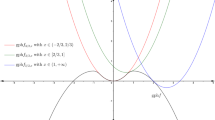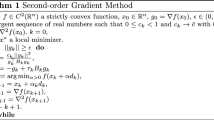Abstract
In this paper we discuss the degeneracy in nonlinear programming with linear constraints, and give a technique for dealing with degeneracy in a general model of reduced gradient algorithms. Under the assumption that the objective function is continuously differentiable, we prove that either the iterative sequence {x k} generated by the method terminates at a Kuhn-Tucker point after a finite number of iterations, or any cluster point of the sequence {x k} is a Kuhn-Tucker point.
Similar content being viewed by others
References
A. Charnes, Optimality and Degeneracy in Linear Programming,Econometrica,20 (1952), 160–170.
G.B. Dantzig, A. Orden and P. Wolfe, Generalized Simplex Method for Minimizing a Linear Form Under Linear Inequality Restraints,Pacific Journal of Mathematics,5 (1955), 183–195.
P. Wolfe, A Technique for Solving Degeneracy in Linear Programming,Journal of the Society for Industrial and Applied Mathematics,11 (1963), 205–211.
R.G. Bland, New Finite Pivoting Ruies for the Simplex Method,Mathematics of Operations Research,2 (1977), 103–107.
Y.Y. Chang and R.W. Cottle, Least-index Resolution of Degeneracy in Quadratic Programming,Math. Prog.,18 (1980), 127–137.
E.L. Keller, The General Quadratic Optimization Problem,Math. Prog.,5 (1973), 311–337.
C.Y. Wang, A Method of Feasible Directions for Nonlinear Programming,Acta Mathematicae Sinica,25 (1982), 15–19 (in Chinese).
M. Frank and P. Wolfe, An Algorithm for Quadratic Programming,Naval Research Logistics Quarterly,3 (1965), 95–110.
D.Z. Du and J. Sun, A New Gradient Projection Method,Computational Mathematics,4 (1983), 378–386 (in Chinese).
X.Y. Gui and D.Z. Du, A Superlinearly Convergent Method to Linearly Constrained Optimization Problems Under Degeneracy,Acta Mathematicae Applicatae Sinica,1 (1984), 76–84.
R.S. Dembo and J.G. Klincewicz, Dealing with Degeneracy in Reduced Gradient Algorithms,Math. Prog.,31 (1985), 357–363.
M.S., Bazaraa and C.M. Shetty, Nonlinear Programming: Theory and Algorithms, John Wiley & Sons, Inc., 1979.
W.I. Zangwill, The Convex Simplex Method,Management Science,14 (1976), 221–238.
P. Wolfe, Methods of Nonlinear Programming, in Recent Advances in Mathematical Programming, R.L. Graves and P. Wolfe (Eds.), 1963.
Author information
Authors and Affiliations
Additional information
This research is partially supported by the National Natural Science Foundation of China.
Rights and permissions
About this article
Cite this article
Han, J., Hu, X. A general technique for dealing with degeneracy in reduced gradient methods for linearly constrained nonlinear programming. Acta Mathematicae Applicatae Sinica 10, 90–101 (1994). https://doi.org/10.1007/BF02006262
Received:
Revised:
Issue Date:
DOI: https://doi.org/10.1007/BF02006262




